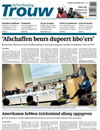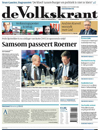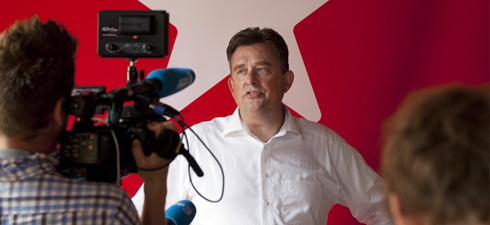The general election campaign of 12 September is still coming up with surprises. According to a survey published on September 3, the VVD party of outgoing Prime Minister Mark Rutte (Liberal) is still in the lead, expected to pick up 35 of the 150 seats in the National Assembly. Its main rival, though, seems to be not the rising star of the Socialist Party led by Emile Roemer (radical left), which had set the tone of the debate over the summer, but the Labour Party (PvdA) under Diederik Samsom.
A week after a televised debate of August 26, during which the socialist leader came across as a less impressive speaker than the Labour part head, NRC Handelsblad states that —
A campaign often reaches a turning point. That moment has already come: it was the debate on RTL, which ended the duel between the VVD and SP. [Yet] the landscape of the campaign can still change dramatically, if the leaders make mistakes or come up with rabbits in the hat, or if an external event such as an acceleration of the euro crisis crops up.
This tight campaign, however, is evidence of a "fragmentation” of the political landscape, which could be dangerous, writes Trouw with some regret —

The great crisis of Dutch politics has been perpetuated, if not made worse. Four or more parties of the centre and a large number of small parties around them. Eleven or more parties will be in Parliament – and all this while we still have to come up with a vigorous political response to the worst economic crisis since the Second World War.
Emile Roemer’s opposition to the austerity policies in Europe allowed him to climb in the polls, however the campaign now seems to be dominated by internal issues such as cuts in the public health sector, the decline in purchasing power and the loss of jobs. Writing in the NRC Handelsblad, Paul Scheffer takes issue with what he preceives as a problem of focus —
Interesting article?
It was made possible by Voxeurop’s community. High-quality reporting and translation comes at a cost. To continue producing independent journalism, we need your support.

We are watching the stage on which our leaders are waging a war of attrition, but we know that the real players are elsewhere. The results of the French or the Greek elections or decisions by the ECB are more important for the future of the Netherlands than our own elections [...] My uncomfortable feeling is down to the fact that political leaders are avoiding the real issue: what do the parties make of Europe? [...] We can no longer do without a vision of the 'purpose' of integration. That is to say, what form will the European Union take?
The lack of European questions, though, may be related to the state of mind of a population that has seen a lot of changes. And regardless of the election results, the winners will have a fight on their hands to make the Dutch hit by the crisis accept further reforms, warns a Volkskrant columnist —

The spoiled Dutchman has a lot of bad news to digest. The age at which he can retire keeps getting higher, while the pension he has paid into over the years is paying out less; he has to take contract jobs, and his protection against dismissal and unemployment benefits are evaporating; the value of his house is falling, and his insurance is more expensive and pays out less. [...] If we do not want to be losers in the new world order, Europe must unite its forces to become an energetic actor speaking out with one strong voice. But this is an uninspiring argument, because it is devoid of any realism in appealing to a ‘We Europeans’ who do not exist.
In any case, forming a new government will be long and difficult. Labour leader Diederik Samsom has already announced that he will not sit in an office “that does not have my name on the door,” reports NRC Handelsblad. Lady-killer of the outgoing government, which he supported without participating in it, Geert Wilders seems to be running out of road. His Freedom Party (PVV) is projected to pick up only 18 seats, against the 24 it has now, and could only play a minor role. In the event of a coalition between the VVD, CDA (Christian Democrats), D66 (Centre Democrats) and PvdA, remarks Trouw, “Wilders's worst nightmare will become a reality.” Furthermore, the daily believes —

The problem this type of centrist government will pose is that the two parties at the ends of the political spectrum – the SP and PVV – will not be represented. One has to wonders how this political frustration will work out – probably in gruelling opposition (PVV) and actions outside of Parliament (SP).












